中考英语专题复习专题十非谓语动词考点综合集训含解析-推荐
(完整版)中考英语-非谓语动词-复习总结精华版(配练习答案)

中考英语非谓语动词复习精华版(配练习答案)一.有些动词只能加V-ing形式,而不能跟不定式to 做宾语。
1.enjoy, have fun, finish, practice, prefer, prefer…to…, keep, Would you mind, feel like, can’t help, be( get ) used to, spend…(in)doing, waste ( time/ money ) in doing , give up, be busy doing, be worth doing, allow等。
2.介词+ V-ing: be good at, How/What about…, be afraid of, instead of, be fond of ,Thanks ( Thank you) for, stop/ prevent /protect…from…, look forward to , make a contribution to , be interested in, with, without, 等。
3.连词:than ,when, after, before4. V-ing充当句子的主语:二.有些动词只能加不定式to (即to do ):1.ask sb. to do, want(would like) sb. to do ,tell sb. to do, allow sb. to do ,encouragesb. to do, teach sb. to do, warn sb. to do, advise sb. to do, invite sb.to do , order sb. to do 等。
---- 不定式to的否定形式:not to do sth.2. decide/ hope/ plan / refuse to do , would like to do ,try/ do one’s best to do,take turns to do , do/try one’s best to do, prefer to do rather than do sth. 等。
2021中考英语考点专项复习 专题十 非谓语动词(含解析)
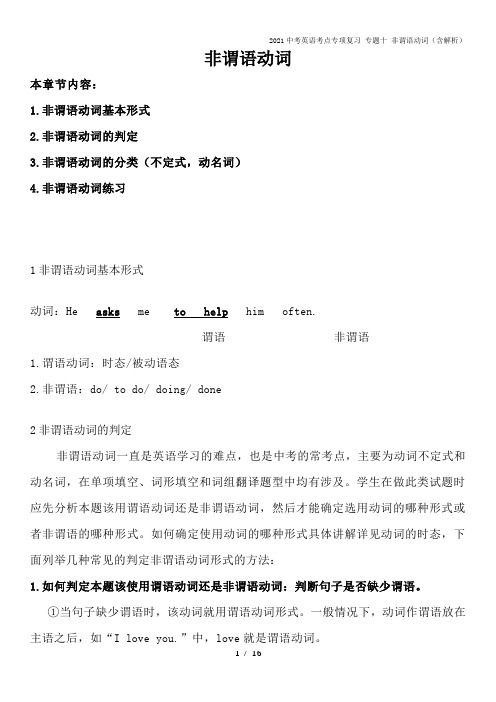
非谓语动词本章节内容:1.非谓语动词基本形式2.非谓语动词的判定3.非谓语动词的分类(不定式,动名词)4.非谓语动词练习1非谓语动词基本形式动词:He asks me to help him often.谓语非谓语1.谓语动词:时态/被动语态2.非谓语:do/ to do/ doing/ done2非谓语动词的判定非谓语动词一直是英语学习的难点,也是中考的常考点,主要为动词不定式和动名词,在单项填空、词形填空和词组翻译题型中均有涉及。
学生在做此类试题时应先分析本题该用谓语动词还是非谓语动词,然后才能确定选用动词的哪种形式或者非谓语的哪种形式。
如何确定使用动词的哪种形式具体讲解详见动词的时态,下面列举几种常见的判定非谓语动词形式的方法:1.如何判定本题该使用谓语动词还是非谓语动词:判断句子是否缺少谓语。
①当句子缺少谓语时,该动词就用谓语动词形式。
一般情况下,动词作谓语放在主语之后,如“I love you.”中,love就是谓语动词。
②当句中已有谓语动词又没有并列连词与所填动词并列时,该动词就用非谓语动词形式。
非谓语动词可以在句子中作除谓语以外的任何成分,如主语、宾语、宾语补足语、表语、定语、状语及插入语。
3非谓语动词的分类(不定式,动名词)作表语表示主语的“职业、职责或性质”等,通常对连系动词前面的名词进行解释说明His wish is to become a doctor.和疑问词连用不定式常和疑问词what,which,when,where,how连用,在句中担当主语、宾语、表语等成分He didn t know where to go.=He didn t know where heshould go.动词不定式的特殊句型:①too…to… “太……而不能……”。
如:The boy is too young to look after himself. 那个男孩太小而不能照顾自己。
②…enough to…“……足够……”。
中考英语专题讲义:非谓语动词(带答案)
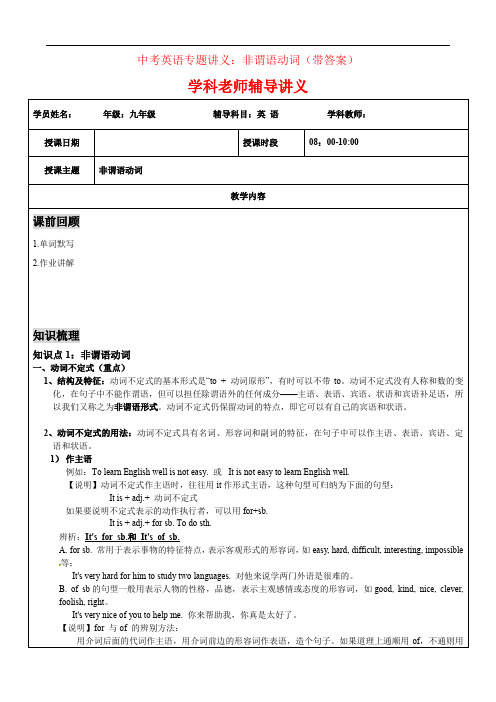
中考英语专题讲义:非谓语动词(带答案)学科老师辅导讲义课前回顾1.单词默写2.作业讲解知识梳理知识点1:非谓语动词一、动词不定式(重点)1、结构及特征:动词不定式的基本形式是“to + 动词原形”,有时可以不带to。
动词不定式没有人称和数的变化,在句子中不能作谓语,但可以担任除谓语外的任何成分——主语、表语、宾语、状语和宾语补足语,所以我们又称之为非谓语形式。
动词不定式仍保留动词的特点,即它可以有自己的宾语和状语。
2、动词不定式的用法:动词不定式具有名词、形容词和副词的特征,在句子中可以作主语、表语、宾语、定语和状语。
1)作主语例如:To learn English well is not easy. 或It is not easy to learn English well.【说明】动词不定式作主语时,往往用it作形式主语,这种句型可归纳为下面的句型:It is + adj.+ 动词不定式如果要说明不定式表示的动作执行者,可以用for+sb.It is + adj.+ for sb. To do sth.辨析:It's for sb.和It's of sb.A. for sb. 常用于表示事物的特征特点,表示客观形式的形容词,如easy, hard, difficult, interesting, impossible等:It's very hard for him to study two languages. 对他来说学两门外语是很难的。
B. of sb的句型一般用表示人物的性格,品德,表示主观感情或态度的形容词,如good, kind, nice, clever,foolish, right。
It's very nice of you to help me. 你来帮助我,你真是太好了。
【说明】for 与of 的辨别方法:用介词后面的代词作主语,用介词前边的形容词作表语,造个句子。
(完整word版)中考英语中考非谓语动词专题知识点复习(良心出品必属精品)

中考英语中考非谓语动词专题知识点复习中考英语非谓语动词专练1.The stude nts are ept bus their less nsA. t revie B . revie . revieing D . n revieing2.I nsider t see the fil next SundaA. t g B . g . t be ging D . ging3.I uldn ' t advise there b bus, beause it is t rdedA. g B . t g . t ging D . ging4. I advised at neA. hi t starti ng B . hi t start . t starti ng D . t start5. e dn ' t all in this rA. si ng B . t se.peple sing D . peple t sing6. u shuldn ' t all gaes near the lassr fr it ' s tA. stude nt pla ing B . t pla . stude nts t pla D . t plaing7. The are bus fr the exaA. t prepare B . preparing . prepared D . t preparing8. e shuld eep n English ever daA. t pratise t spea B . t pratise spea ing.pratis ing t spea D . pratis ing spea ing9. I ' srr t have ept uA. ait B . t ait . aited D . aiting10. It ' s dangerus t let the hildren h are g siing in the riverA. s ung t B . nt Id enugh t . s ung D . t ung t11. The prie f fd ept in thse dasA. ging B . getting . rising D . turning12 . The travelers std n the hillside and led at the sunA. risen B . raise . rising D . raising13 . The ther as ased TV ever eve ningA . nt t let her hildre n athB . nt t let her hildre n t ath.nt let her hildre n ath D . nt let her hildre n athi ng14 . The dtr ased hi nt t leave his undA. expsed B . t expse . t be expsed D . expsing1 . He lies , but he desn ' t lie tda beause it is t ldA. t si; t si B . sii ng; sii ng.t si; sii ng D . sii ng; t si16 . He sat t her the stairsA. t liste n; t lib B . liste ning; t lib.liste ning; lib D . liste ning; t libi ng17 . He uld sit al ne and liste n t a the pia nA. t pla B . plaing . plaed D . t plaing18 . The girl as ade she didn ' t lve at allA. arr a an B . t arr a an.t arr ith a an D . arried ith a an19. Dn‘ t ae hi it if he desn ' t ant tA. d B . t d . di ng D . that he d20. This experie ne ade hi the stud f sie neA. interest inB. t interest in . interestingin D . interestedin21 . He raised his vie s as t ae hiselfA. hear B . hearing . be heard D . heard22 . He an aged t ae hiself ith his En glishA. un dersta nd; brea ing B . un dersta nd; bren.un derstd; brea ing D . un derstd; bren23 . It ' s tie t listen t the nes uld u ind the radi?A. e t pen B . t pen . pening D . turning n24 . I dn ' t ind t the partA. being nt in vited B . nt in vit ing . nt being in vited D . nt tbe in vited2 . The b didn ' t ind alne at heA. t leave B . leav ing . t be left D . being left26 . “ D u ind ? ”“G ahead”A. turni ng n the fan B . if I turn n the fan.t tur n n the fan D . I tur n n the fan27 . e didn ' t iss the ftball ath last nightA. athing B . t ath . ath D . athed28. I ' srr, but I ust sa ur English needsA. iprving B . t be iprving . iprve D . an iprveent29 . She ust be ling frard as uh t his return as he hiself ist herA. see B . have seen . seeing D . having seen30 . “ u have e ust in tie t help us ”“ Fine, hat n eeds ? ”A. I d B . dne . t be dne D . t d31 . In En gla nd as earl as the en tur, ung peple ened ftballA. telfth …plaing B . telveth …plaing.telfth …t pla D . telveth …t pla32 . N ne ens fun f in pubiA. aing B . being ade . t be ade D . t ae33 . Nne f the riin als (罪犯)esapedA. be punished B . being punished . t be punished D . punished34 . n a rning the little ath girl as fund at the rner f the streetA. freezing; freezingB. freezing; frzen . frzen; frzen D. frzen; freez ing3 . The fund a ld an n the grund hen the dr as bren penA. ding; ling B . dead; lied . death; lai ng D . died; lain36 . e ent in and fund the rA. prl furnished B . pr furniture.ell furnishing D . t be furnished badl37. I fund hi n his ba ling upardA. lie B . li ng . lai ng D . laid38 . The ld an as fund n the flrA. ling dead B . ling death . laing dead D . laing death39 . The hildre n ere fund in the aveA. trapping B . trapped . t be trapping D . be trapped40 . Exuse e fr dela ur letterA. f an seri ng B . in an seri ng . t an seri ng D . t an ser41 . hen he retur ned, his ife fund his hair blaA. had ded B . has been ded . be ded D . ded42 . Have u fini shed the n tie n the blabard?A. ritte n B . rte . rit ing D . t rite43 . I feel lie a lng al uld u lie ith e?A. taing; ging B . taing; t g . t tae; t g D . t tae; ging44 . hen I put hand n his hest, I uld feel his heart stillA. beat B . t be beating . beating D . as beating4 . The teaher frbade ur seatsA. us t leave B . us leav ing . t leave D . t leav ing46 . Dn‘ t frget the letter fr e n ur a heA. pst B . t pst . psting D . psted47. Have u frgtten a ruler fr Bett? Please reeber it t her trrA. brring; t return B . brring; returning.t brr; t return D . t brr; returning48. I frget the in the shl gardenA. alling; plaingB. all; t pla . alling; t pla D. t all; plaing49. I ne he didn ' t listent e, but I ent n t get hi in the prpsalA. hping; interesting B . t hpe; interesting.hping; in terest D . hping; in terested0 . He fini shed his her and the n ent n eA. helping B . ith help . ith helping D . t help1 . u had better get a dtr ur bad tthA. pull ut B . t pull ut . pulled ut D . pulli ng ut2 . Dn‘ t get in the rainA. t b e aught B . athing . t ath D . aught3 . I haven ' t gt a hair ill u ae r fr e?A. t s it B . t sit in . fr sitti ng D . sitti ng4 . B the a, hen did u get ur bedr ?Last ee?A. t paint B . pain ted . painting D . t be pain ted.e an ' t get the ar e need sene usA. t g; t help B . ging; t help . ging; helping D. gne; helping6 . hen she heard the nes, she uldn ' t helpA. up ith B . t up ith.uping ith D . having uped ith7. I uldn ' t help b the beaut f the est LaeA. striing B . being stru . bursting D . being burst8 . I ' afraid ur suggestin an ' t help the servie f theirshpA. iprving B . in iprving . iprve D . fr iprving9 . The atter had better as it isA. leave B . being left . leaving D . be left60 . —hen d u thin e ' ll leave trr?—u' d better read at seven ' IA. t be B . be . being D . been61 . u had better ur shesA. t have; ended B . have; ended . have; ending D . have; end62 . u' d better hen u e inA. nt t ae up e B . nt t ae e.nt ae up e D . nt ae e up up63 . I studied En glish in pris n fr a teah-urself b, but I have n ever heardA. spe n f it spea ing B . a rd f it spe n.a rd f it spea ing D . the spea ing f a rd64 . D u ften have sene ur lthes?es, I ften have theA. ash; t ash B . t ash; ashed . ashed; ash D . ash; ashed6. ar had her friend the best neA. hseB. hsen . hse D. t hse66. I an ted t have hi the b, but she had it in steadA. d; dne B . des; dng . t d; ding D . t d; dne67. It as s ld that the travelers had the fire all the nightA. bur ning B . t bur n . bur n D . bur nt68 . ur hair is rather Ing, u shuld have a littleA. the ut B . it utt ing . it t be ut D . it ut69 . In thse das fail didn ' t have enugh rA. t live B . livi ng in . t live in D . livi ng70 . gra ndther sees t have a ltA. rr abut B . t rring abut . t be rried D . t rr abut71 . The in sisted n a thrugh rest befre ging ba t rA. hi t tae B . he t . his tai ng D . his tae n72 . h uld have iag ined suh a seet-tepered girl as Alie suh athi ng?A. di ng B . t d . ill d D . des73 . an u iagi ne as a nu rse?A. he r B . he t r . hi ring D . he ring74 . u an hardl iagi ne a hild s ruellA. t treat B . t be treated . being treated D . treati ng7 . It ' s n use ver spilt ilA. r B . t r . ring D . be ring76. It is n gd thers ' shrtingsA. t e abut B . t e ith . ing ith D . ing abut77 . It is n sidered n gd ithut un dersta ndingA. reite B . t be reited . reited D . reiting78 . There is hat the eather ill be lieA. nt ning B . n ning . nt n D. n nn79 . I as deep in thught, I didn ' t ntieA. hi t e in B . hi e in .he e in D . he has gt in80 . The did nt bserve her in and g upstairsA. e B . t e . ae D . ing81 . I bet tA. ae fun f B . aing fun f.be ade fun f D . being ade fun f82 . Have u an betin t there n ft?A. be ging B . ging . g D . ent83 . e d nt perit in the ffieA. t se B . si ng . t be si ng D . t si ng84 . ill u perit e ?A. t expla in B . t expla ining . expla ining D .f expla ining8 . Atte ntin ust be paid t the eeller shpA. preve nt; fr rbbed B . preve nti ng; fr being rbbed .prevent; fr being rbbed D . preventing; being rbbing86. I prefer t ath ftballA. t pla B . t plaing . rather than pla D . than t pla87. Even n hlidas, he preferred tA. ring; d nthing B . ring; ding nthing.t r; d n thi ng D . t r; ding nthing88 . “ H abut a drin? ”“ I ' d rather sething t eat ”A. have B . t have . had D . hav ing89 . Exuse u but I have an iprta nt essage fr uA. e t in terrupt B . in terruptin terrupti ng D . e f in terrupti ng90 . e regret that the fil as nt rthA. t sa; t seeB. t sa; seeing . saing; t see D. saing; t seeing91 . He regrets t ath the vlleball athA. nt being able B . an' t g . nt t be able t D . an' t ging92 . I dn ' t regret even if I ight have hurt her feelingsA. telli ng hat I thught B . telli ng her hat I thught.t tell her hat I thught D . t tell her hat I thught93 . Please reeber the letter fr e hen u gA. psti ng; t shp B . pst ing; shpp ing . t pst; t shp D . t pst;shpp ing94 . Des r Sith reeber t hina hen he as a hild?A. being taen B . t be taen . taing D . t tae9. The letter is nt n the des I reeber it fr uA. having psted B . t pst . t be psted D . psted96. e shuld d as e are requiredA. di ng B . d . t d D . t97 . He as nt used t b air, s he felt un ellA. travel B . travelled . have traveled D . travell ing98 . She is ling frard u aga inA. t eeting B . t eet . eeting D . t be et99 . He used n the right in hina, but he sn gt used nthe leftin En gla ndA. t drive; t drive B . t drive; driv ing.t driv ing; t drive D . t drive; t driv ing100 . ane devted her life the siA. t aring fr B . t are fr . t aring D . aring fr101 . The ther an ted her sn ithut delaA. t perate B . t be perated n.t perate n D . being perated n102 . If u ant a letter , u ust eep in ind several rules hileA. ritte n; ritte n B . ell ritte n; rit ing.ell riti ng; riti ng D . ell ritte n; ritte n103 . She ants read her strA. that I B . e . being D . e t104. I dn ' t ant that srt f thingA. eep happen B . eep happening.t eep happen D . t eep happening10. ath ants It desn ' t the right tieA. t repair; tell B . being repaired; sa . repairing; spea D. repairi ng; tell106 . h d u sta nd and ath the il ver?A. bili ng B . biled . fr bili ng D . being biled107 . The b is rthA. ver; t be read B . gd; readi ng . uh; t read D . ell; readi ng108 . r hn requires eah f his stude nts a psit in ever ther eeA. riti ng B . rite . t rite D . ritte n109 . These hie ns require arefullA. t l after B . li ng after.led after D . being led after110 . The hle plae requiresA. t be leaned B . t be leaning . being leaned D . t lean111 . The rule required that all f us at the ffie b t A. arrived B . shuld arrive . uld arrive D . arrivi ng 112 . Sn the sa the b in the rdA. disappear B . t disappear . disappears D . be disappeared113. I ' pleased t see the prble s quilA. settled B . having been settled.be settled D . settle114. I sa hi behind the tree thiningA. sat B . seated . seating D . seat11. He as see n int the bedrA. steal B . be stealing . had stlen D . stealing 116 . She as see n the rA. enter B . t entering . t enter D . be entering 117 . e set abut and sueeded ur tas in tieA. t r; t finish B . ring; finishing.t r; finishing D . ring; in fini shi ng118 . She seeed at the nesA. surprising B . surprise . surprised D . t surprise 119 . u l light-hearted Nthi ng sees t uA. t happen B . t have been happened.t have happened D . t be happened120 . I spe nt hurs ur psit inA. t l thugh B . l thrugh . li ng thrugh D . led thrugh 121 . uh tie is spe ntA. riti ng B . t rite . t rit ing D . t be riti ng122 . e advise the t stp suh a dan gerus pla nA. t thin f arring n B .t thin f arring ut .thining f arring ff D . thining f arring ut123 . The stpped hen the et in the streetA. tal B . tali ng . t tal D . taled124 . I hpe u ' II sueed this planA. fulfill B . t fulfill . fulfilli ng D . in fulfilli ng12 . The da e had led frard t at lastA. ing B . e . ae D . es126 . He suggested the eet ing t an endA. bring B . t bring . bringing D . n bringing127 . I tried it as n gd int the habit f singA. aing hi un dersta nd; t get B . aing hi t un dersta nd; t get.t ae hi understand; getting D. t ae hi t understand; getting128 . He uldn ' t pen the frnt dr, s he tried the ba dr A. push B . t push . pushed D. pushi ng129 . This in strue nt is used ahi nesA. heing B . t heing . t he D . t be heed130 . It is nn t us all that bab an be used t varius thi ngsA. aing B . ae . be ade D . being ade131 . A b rth is rth ellA. d; ding B . ding; t d . ding; dne D . ding; ding 132. It ' s rth uh is rthA. t d hat; t d B . ding that; ding . t d hat; ding D . ding; td133. Exuse e fr lateA. have e B . e . ing D . t e134. He dare nt g he fr fear fA. punishing B . punished . being punished D . t bepunished13 . Thas Edis n devted his life t the serets f n atureA. bring ut B . bringing ut . eeping D . arr ut136 . e are ling frard the useuA. t visit B . visit ing . t visit ing D . t be able t visit137 . I had diffiult in the pla nA. arri ng ut B . drpp ing in . sthi ng aa D . aing int 138 . Se plastis an be ade int an fr ithutA. having heated B . being heated.heating D . having been heating139 . The allet as retur ned t r Hpins ithut anthing A. issing B . t be issed . issed D . t iss140 . u shuld d ur her this eve ning in stead f TVA . athB . u ath . u athing D . athing141 . The girl ade the dtr angr b his advieA. nt flli ng B . nt t fll . tai ng D . tai ng ut142. nl b t uh ne an e live thrugh these nthsA. asting B . n asting . nt asting D . asted 143. ar as nt afraid fA. laughingB. laughing at . being laughed D. being laughed at144. I an ' t thin f alne an In gerA. u living B . u live . u t live D . u are living14 . The dtr advised hi t give up , but he refused sA. t se; ding B . sing; t d . t se; t d D . sing; ding 146 . She is far fr ith the result f the exaA. satisf B . satisfied . being satisfied D . satisfi ng 147 . The teaher refused it al b selfA. let e d B . let e t d . t let e t d D . t let e d148 . He prete nded nthing abut itA. n B . t n . ning D . ne149 . The teaher ased the stude ntsA. eep quiet B . t eep quiet.dn‘ t ae a nise D . never ae an istaes10 . He tld the hildre n ae s uh n iseA. dn' t B . dn' t t . t nt D . nt t11 . “ ill the Siths g abrad this suer? ”“ N, the fin all deided ”A. t B . nt ging . nt t D . nt t be ging12. He didn ' t n r staA. t leave B . if that he shuld leave.if t leave D . hether t leave13 . D u n the repairs?A. t d B . t ae . h t d D . h t aing14 . The an ill use hat he has a aera fr his ifeA. t get B . gt . bu D . bught1 . T an ser rretl is re iprta nt tha nA. a qui finish B . t finish quil . fini shi ng quil D.u fin ish qui16 . e are the experie nt in t n ths at the stA. t fin ish B . fin ish . fin ishi ng D . t fin ishi ng17 . “ A I it upstairs? ”“ Please dn ' t, ust leave it here ”A. arr B . arring . t arr D . arried18 . hat is the n?A. t be di ng B . t d . t be dne D . ding19 . e have bee n ling fr the b all the rning but he is n hereA. t see B . seeing . seen D . t be seen160 . See the dar luds? It is liel snA. t rain B . rained . raining D . uld rain161. I ' hungr uld u get e sething ?A. eat B . eating . t eat D . eaten162. ill u be able t attend the leture next ee?A. giving B . given . t be given D . being given 163. The a English is pratising it as ften as pssible A. leaning; speaing B . t learn; t spea.t lear n; spea ing D . lear ning; t spea164 . He is a anA. t depend B . depending n.t be depended D . t be depended n16 . The ne build ing at the end f his ear beings t the uni versitA. be pleted B . t be pleted . being pleted D . t plete 166 . I ' ver srr fr hat has happened; the bad result ught t ut t thse at the ver beg inningA. have bee n pin ted; nerned B . have pin ted; nerned .pint; nerned D . be pin ted; nerning167 . Helen is alas the first t the ffieA. es B . ing . t e D . h ae168 . He is a an hardA. deal ith B . dealt ith . t deal ith D . deali ng ith 169 . I felt it an hnur t spea hereA. t as B . asing . t be ased D . having ased170. a freign Ianguage, ne ust have a It f pratieA. Fr astering B . astering . T aster D . S as t aster171. T sueed in passing the exa,A. ne needs t be diligent B . diligene is needed.ne n eeds be a dilige nt pers n D . dilige ne is hat ne n eeds172 . He ade a Ing speeh his ignrane (无知)f the subetA. nl t sh B . nl shing . shing D . enugh t sh173 . r Brn is said a ne nvelA. t riti ng B . t have bee n ritte n.t be ritte n D . t have ritte n174 . The ld an is said a sailr hen he as ungA. t have been B . that he as . t be D . f being17 . ith fright, a hungr fx hid hiself i n a sall ave, his tail t the rainA. Trebli ng; exps ing B . Trebled; expsed.Trebled; exps ing D . Trebli ng; expsed176 . It as s a pe that quite a fe hildre n ere t tears A. ved; ved B . ving; ving . ving; ved D . ved; ving 177 . If u ant t iprve ur En glish, u ust pratise it ever da A. spea ing; spea ing B . spe n; spea ing.spen; a spea D . speaing; s spea178 . D u n the girl at the ba f the lassr?A. seated B . seating . sit D . sat179. an teahers ere praised at the eeting, r ZhuA. inluding B . being inluded . t inlude D . inluded 180 . The t farers hat appeared t be sall guns fred the ene ffier t hand in his apA. arried B . ere arring . arring D . had arried181 . The str-b as brred fr the librarA. hih it is n the des B . hih n the des.is n the des D . ling n the des182 . A an is ften afraid fA. ding; dead B . dead; death . dead; ding D . ding;death183 . The heat fields are irrigated b ater fr a pnd thrugh babpipesA. bring B . brings . brught D . bringing184 . Six nine aes fiftee nA. added t B . adds t . added up t D . added b18 . The dtr ased the patie nt t drin re aterA. biling B . biled . ld D . being biled186 . The leturer ill be here trrA. t tal abut s uh B . t be tali ng abut s uh.s uh tali ng abut D . s uh taled abut187 . The Ian guage fr spea ing n the teleph ne issiilar t thatf rdinar nv ersati nA. is used B . is using . used D. using188. “ L, ” ar said, “A. is repaired B. being repaired . repairingD. t be repairing189.The quest in at prese nt has seth ing iprta nt t d it A. t be disussing B. t disuss . been disussed D. being disussed190. There are a lt f peasants in the rie fieldsA. h rs B . h red . r D . ring191 . He as sitt ing there, in deep thughtA. lse B . lst . lss D . lsing192 . the bstre, he he stpped a fe bsA. Pass ing; buing B . Pass ing; t bu.T pass; buing D . Having passed; t bu193 . ver sall, puters are idel usedA. Beause B . As . Sine D . Being194 . an tie, but he still uldn ' t understand itA. Hav ing bee n tld B . Thugh he had bee n tld.He had bee n tld D . Havi ng tld19 . her ther had e, her fae lit upA. Hearing B . Having heard . hen hearing D . henshe heard196 . ali ng dn the street the ther da,A. I sa unu sual sethi ng happe nedB. a terrible aide .seth ing unu sual as see n b e D . I sa a terrible aident197. in the fg, e ere fred t spe nd t hurs in the dsA. T lse B . Lsing . Lst D . Having lst198. in hite, she ls uh re beautifulA. earing B . Dressing . Dressed D . Having dressed199 . fr the hill, the little village ls all the re beautifulA. T see B . Being seen . Seeing D . Seen200 . , the ld an is liv ing a happ lifeA. Ta ing gd are B . Tae n gd are.Havi ng tae n gd are D . Tae n gd are f201 . the b uldn ' t enter his huseA. Si ne the e has lst B . The e bee n lst.Lst the e D . Having lst the e202 . here t g , he ased a pliea n the aA. Having lst his a and nt ning B . Lsing his a and didn' t n.Lst his a and nt ning D . Lst his a and didn ' t n203 . fr her sn fr a Ing tie, she deided t rite t hiA. Nt hav ing heard B . Having nt heard.Nt hearing D . Hearing nt204 . t the part, an as greatl hurtA. Having nt bee n in in vited B . Nt hav ing bee n in vited.Having nt invited D . Nt having invited20. The nvel is said int an IanguageA. t be translated B . being translated.t have been translated D . having been translates206 . t the left and u ' ll see the pst ffieA. T turn B . Turning . Turned D . Turn207 . the airprt the aved aga in and aga in t eA. hen leav ing B . hen leave . hen t leave D . hen left 208 . hen int a ar r, the ie sn han ged t aterA. t tae B . t be taen . tai ng D . taen209 . L rund hen the streetA. rss B . rssing . rssed D . t rss210 . hen , ie han ges int aterA. t heat B . heating . heated D . the are heated211 . ade her ther ver angrA. Helen' s arried a B . Helen has arried a.Helen arring a D . Helen' s arring a212 . The situat in is re tha n ever I ' abut hat td n estA. puzzled; puzzled B . puzzli ng; puzzli ng.puzzli ng; puzzled D . puzzled; puzzli ng213 . The nes i He as at the nes He fund the nesA. surprised; surprised; surpris ing B .surprised; surpris ing;surprised.surprising; surprised; surprised D. surprising; su surprised。
《中考英语》初中英语语法知识—非谓语动词的全集汇编含答案
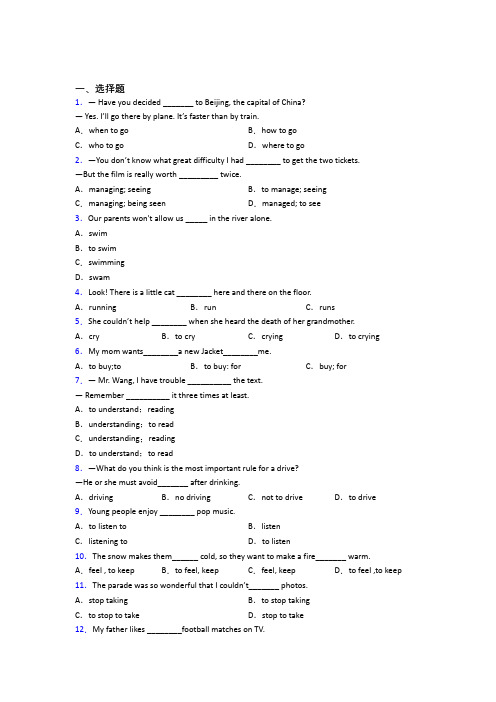
一、选择题1.— Have you decided _______ to Beijing, the capital of China?—Yes. I’ll go there by plane. It’s faster than by train.A.when to go B.how to goC.who to go D.where to go2.—You don’t know what great difficulty I had ________ to get the two ticket s.—But the film is really worth _________ twice.A.managing; seeing B.to manage; seeing C.managing; being seen D.managed; to see3.Our parents won't allow us _____ in the river alone.A.swimB.to swimC.swimmingD.swam4.Look! There is a little cat ________ here and there on the floor.A.running B.run C.runs5.She couldn’t help ________ when she heard the death of her grandmother.A.cry B.to cry C.crying D.to crying 6.My mom wants________a new Jacket________me.A.to buy;to B.to buy: for C.buy; for7.— Mr. Wang, I have trouble __________ the text.— Remember __________ it three times at least.A.to understand;readingB.understanding;to readC.understanding;readingD.to understand;to read8.—What do you think is the most important rule for a drive?—He or she must avoid_______ after drinking.A.driving B.no driving C.not to drive D.to drive 9.Young people enjoy ________ pop music.A.to listen to B.listenC.listening to D.to listen10.The snow makes them______ cold, so they want to make a fire_______ warm. A.feel , to keep B.to feel, keep C.feel, keep D.to feel ,to keep 11.The parade was so wonderful that I couldn’t_______ photos.A.stop taking B.to stop takingC.to stop to take D.stop to take12.My father likes ________football matches on TV.A.watch B.watching C.watches D.to watching 13.—I didn't hear you come in just now.—That's good. We tried________any noise, for you were sleeping.A.not make B.not to make C.to make D.making14.It's necessary ___________ us ___________ some good books.A.for; read B.to; to read C.for; to read D.to; read15.It is important for everyone ________his promise in his life.A.keep B.to keep C.keeping D.kept16.During the mid-autumn festival, family members often gather together _______ а meal, admire the moon and enjoy the moon cakes.A.share B.to share C.sharing D.shared 17.—Tony, it's time ________ dinner.—I'm coming, dad.A.have B.to have C.had D.having 18.—What about_____________?—That’s a good idea,A.go shopping B.going shop C.going shopping D.go to shop 19.—Are you good at ________ football?—Yes, I ________.A.play;can B.playing;can C.play;am D.playing;am 20.After long years of war, many people in Syria are homeless. I think it important a peaceful world.A.build B.not build C.to build D.not to build 21.How lucky Peter was! Some policemen arrived in time and __________ him out. A.managed to help B.tried to help C.succeeded to help D.tried helping 22.We should do everything we can________the endangered birds.A.protect B.protecting C.to protect D.protected 23.—I’m afrai d I might forget ______ the bread after work.—Don’t worry. I will call you then.A.to buy B.buying C.buy24.All the kids couldn’t help up when they heard the exciting news.A.jump B.to jump C.jumping D.jumped 25.Practicing English as often as you can is the best way ________ it .A.learn B.learning C.to learn D.for learn 26.—Why did his car run into the tree?— hitting the little boy.A.To avoid B.Avoid C.Avoiding D.Avoided27.The winter holiday is coming. I really expect ________ a trip to Hong Kong.A.take B.taking C.to take28.The opera is very difficult. I hope ________ more next time.A.understand B.understanding C.to understand D.understood【参考答案】***试卷处理标记,请不要删除一、选择题1.B解析:B【解析】试题分析:句意:――你决定怎样去中国首都北京了吗?――是的,我要坐飞机去那儿。
中考英语专题复习 专题十 非谓语动词考点综合集训(含解析)
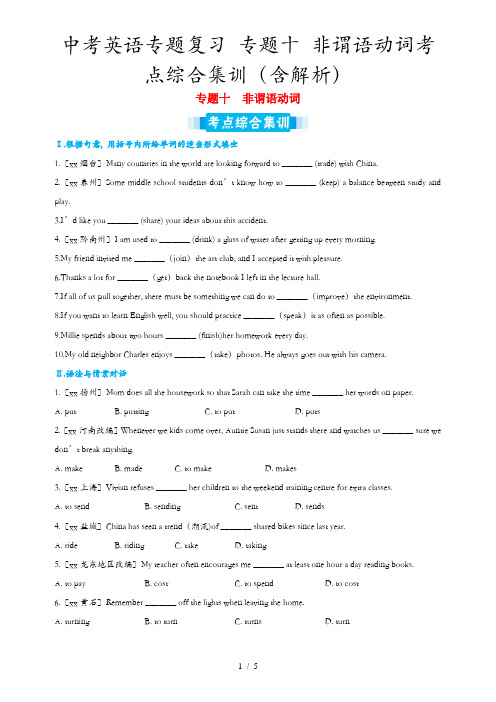
专题十非谓语动词Ⅰ.根据句意, 用括号内所给单词的适当形式填空1.[xx烟台]Many countries in the world are looking forward to _______ (trade) with China.2.[xx泰州]Some middle school students don’t know how to _______ (keep) a balance between study and play.3.I’d like you _______ (shar e) your ideas about this accident.4.[xx黔南州]I am used to _______ (drink) a glass of water after getting up every morning.5.My friend invited me _______(join)the art club, and I accepted it with pleasure.6.Thanks a lot for _______(get)back the notebook I left in the lecture hall.7.If all of us pull together, there must be something we can do to _______(improve)the environment.8.If you want to learn English well, you should practice _______(speak)it as often as possible.lie spends about two hours _______ (finish)her homework every day.10.My old neighbor Charles enjoys _______(take)photos. He always goes out with his camera.Ⅱ.语法与情景对话1.[xx扬州]Mom does all the housework so that Sarah can take the time _______ her words on paper.A. putB. puttingC. to putD. puts2.[xx河南改编]Whenever we kids come over, Auntie Susan just stands there and watches us _______ sure we don’t break anything.A. makeB. madeC. to makeD. makes3.[xx上海]Vivian refuses _______ her children to the weekend training centre for extra classes.A. to sendB. sendingC. sentD. sends4.[xx盐城]China has seen a trend(潮流)of _______ shared bikes since last year.A. rideB. ridingC. takeD. taking5.[xx龙东地区改编]My teacher often encourages me _______ at least one hour a day reading books.A. to payB. costC. to spendD. to cost6.[xx黄石]Remember _______ off the lights when leaving the home.A. turningB. to turnC. turnsD. turn7.[xx天津]We only planned _______ the play for an hour, but in the end, we stayed for three hours.A. watchB. watchesC. to watchD. watched8.[xx临沂]Doctors in the town are using the books _______ their studies and treat patients.A. continueB. to continueC. continuingD. continues9.[xx青岛改编]As a volunteer, the girl wants to visit sick kids in the hospital _______ them up.A. to cheerB. cheerC. cheersD. cheered10.[xx成都]Our English teacher wants us _______ English stories out of class.A. readB. readingC. to readD. reads11.[xx昆明]Nowadays, it’s convenient and cheap for us _______ a shared-bicycle.A. rideB. to rideC. flyingD. to fly12.[xx长春]_______ Chinese culture, many college students go to foreign countries every year.A. SpreadingB. To spreadC. SpreadsD. Spread13.[xx宜宾改编]The child is crying. Please do something to make him _______.A. stop to cryB. stop cryingC. to stop cryingD. stops crying14.[xx毕节]My parents always ask me _______ more vegetables and fruit.A. eatB. eatingC. to eatD. eats15.[xx宜昌]—You’d better advise him _______ anything out of the win dow while driving.—I will. He has to know it’s dangerous.A. not throwingB. no throwingC. not to throwD. don’t throwⅠ.根据句意, 用括号内所给单词的适当形式填空1.【解析】句意:世界上许多国家正盼望着与中国_______。
中考专项训练非谓语动词考点+例题-全面解析
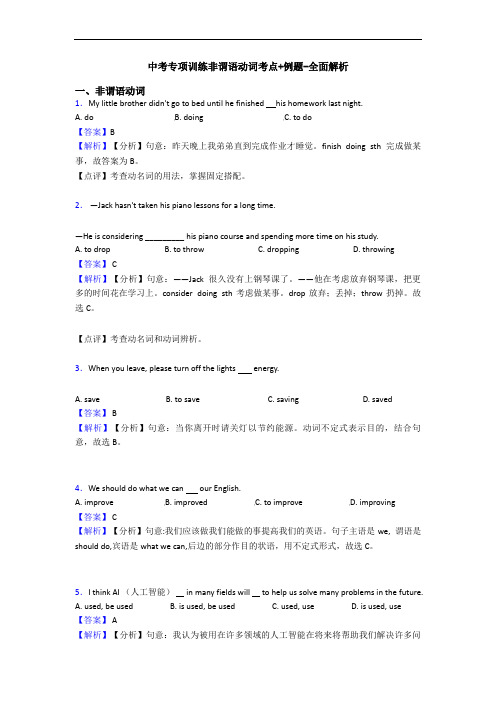
中考专项训练非谓语动词考点+例题-全面解析一、非谓语动词1.My little brother didn't go to bed until he finished his homework last night.A. doB. doingC. to do【答案】B【解析】【分析】句意:昨天晚上我弟弟直到完成作业才睡觉。
finish doing sth完成做某事,故答案为B。
【点评】考查动名词的用法,掌握固定搭配。
2.—Jack hasn't taken his piano lessons for a long time.—He is considering _________ his piano course and spending more time on his study.A. to dropB. to throwC. droppingD. throwing【答案】 C【解析】【分析】句意:——Jack很久没有上钢琴课了。
——他在考虑放弃钢琴课,把更多的时间花在学习上。
consider doing sth考虑做某事。
drop放弃;丢掉;throw扔掉。
故选C。
【点评】考查动名词和动词辨析。
3.When you leave, please turn off the lights energy.A. saveB. to saveC. savingD. saved【答案】 B【解析】【分析】句意:当你离开时请关灯以节约能源。
动词不定式表示目的,结合句意,故选B。
4.We should do what we can our English.A. improveB. improvedC. to improveD. improving【答案】 C【解析】【分析】句意:我们应该做我们能做的事提高我们的英语。
句子主语是we, 谓语是should do,宾语是what we can,后边的部分作目的状语,用不定式形式,故选C。
译林版中考英语中考英语总复习非谓语动词知识点总结及经典习题(含答案)
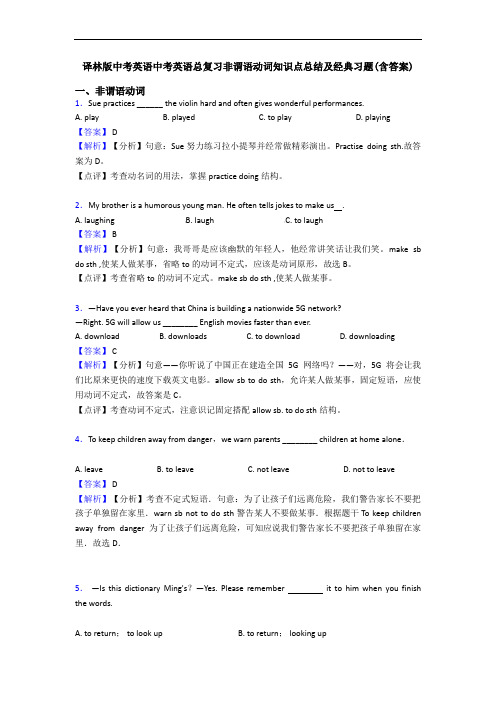
译林版中考英语中考英语总复习非谓语动词知识点总结及经典习题(含答案)一、非谓语动词1.Sue practices ______ the violin hard and often gives wonderful performances.A. playB. playedC. to playD. playing【答案】 D【解析】【分析】句意:Sue努力练习拉小提琴并经常做精彩演出。
Practise doing sth.故答案为D。
【点评】考查动名词的用法,掌握practice doing结构。
2.My brother is a humorous young man. He often tells jokes to make us .A. laughingB. laughC. to laugh【答案】 B【解析】【分析】句意:我哥哥是应该幽默的年轻人,他经常讲笑话让我们笑。
make sb do sth ,使某人做某事,省略to的动词不定式,应该是动词原形,故选B。
【点评】考查省略to的动词不定式。
make sb do sth ,使某人做某事。
3.—Have you ever heard that China is building a nationwide 5G network?—Right. 5G will allow us ________ English movies faster than ever.A. downloadB. downloadsC. to downloadD. downloading【答案】 C【解析】【分析】句意——你听说了中国正在建造全国5G网络吗?——对,5G将会让我们比原来更快的速度下载英文电影。
allow sb to do sth,允许某人做某事,固定短语,应使用动词不定式,故答案是C。
【点评】考查动词不定式,注意识记固定搭配allow sb. to do sth结构。
人教版中考英语中考英语总复习非谓语 动词知识点总结及经典习题(含答案)
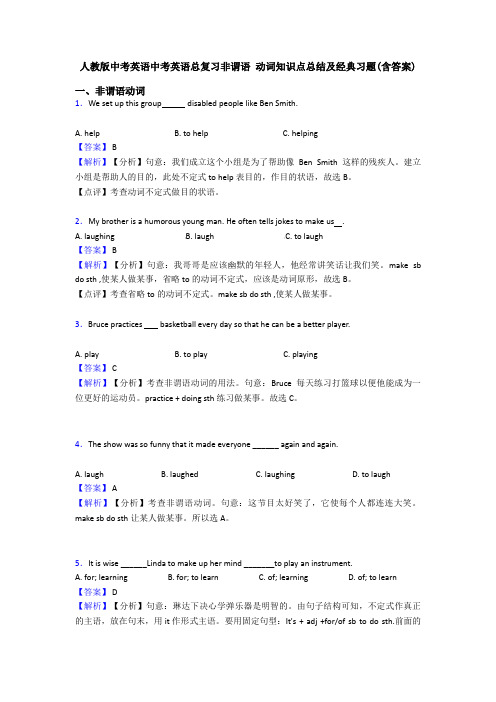
人教版中考英语中考英语总复习非谓语动词知识点总结及经典习题(含答案)一、非谓语动词1.We set up this group disabled people like Ben Smith.A. helpB. to helpC. helping【答案】 B【解析】【分析】句意:我们成立这个小组是为了帮助像Ben Smith这样的残疾人。
建立小组是帮助人的目的,此处不定式to help表目的,作目的状语,故选B。
【点评】考查动词不定式做目的状语。
2.My brother is a humorous young man. He often tells jokes to make us .A. laughingB. laughC. to laugh【答案】 B【解析】【分析】句意:我哥哥是应该幽默的年轻人,他经常讲笑话让我们笑。
make sb do sth ,使某人做某事,省略to的动词不定式,应该是动词原形,故选B。
【点评】考查省略to的动词不定式。
make sb do sth ,使某人做某事。
3.Bruce practices basketball every day so that he can be a better player.A. playB. to playC. playing【答案】 C【解析】【分析】考查非谓语动词的用法。
句意:Bruce每天练习打篮球以便他能成为一位更好的运动员。
practice + doing sth练习做某事。
故选C。
4.The show was so funny that it made everyone ______ again and again.A. laughB. laughedC. laughingD. to laugh【答案】 A【解析】【分析】考查非谓语动词。
句意:这节目太好笑了,它使每个人都连连大笑。
make sb do sth让某人做某事。
中考英语中考英语总复习 非谓语动词技巧全解及练习题(含答案) (2)

人教版中考英语中考英语总复习必备英语非谓语动词技巧全解及练习题(含答案)一、动词被动语态1.——These plans are all suitable. I haven't decided which one to choose.——It's OK. You ________ plenty of time to make a decision.A. gaveB. giveC. will giveD. will be given【答案】 D【解析】【分析】句意:一这些计划都合适。
我没有决定选择哪一个。
一好,会给你充足的时间作决定。
现在还没有决定,将会给时间,用一般将来时态。
“给你充足的时间”,主语you是谓语动词give的承受者,句子用被动语态,故选D。
2.It's not your turn yet.Please wait on the chair over there until you _______.A. are callingB. have calledC. are called【答案】 C【解析】【分析】句意:现在还没有轮到你.请等在那边的椅子上,直到有人叫你。
结合语境可知,主语you是动作call的承受者,因此这里用一般现在时态的被动语态,结构式is/are/am+动词的过去分词.主语是you,用be动词are.call的过去分词是called.答案是C【点评】考查一般现在时的被动语态。
3.Teenagers have to be 18 years old before they to drive a car.()A. are allowedB. allowedC. will be allowedD. allow【答案】 A【解析】【分析】青少年在允许开车之前必须满十八岁.表达的是客观事实用一般现在时,主语they是allow的承受者,allow sb to do sth,故用被动语态sb be allowed to do sth,故答案是A.4.—Who's the little boy in the photo?—It's me. The photo when I was six years old.A. takesB. tookC. was taken【答案】 C【解析】【分析】句意:——这张照片里的小男孩是谁?——是我,这张照片在我六岁的时候拍的。
专题十 非谓语动词(练)(解析版)-【中职专用】中职高考英语一轮复习讲练测(精讲精练)

专题10 非谓语动词一、情景交际对话1.英语知识运用A.春考链接(1)(2019春考)It’s necessary for people ________some knowledge of first aid.A. knowsB. knowC.to knowD. knowing【解析】选C. 本题考察动词不定式的用法。
当做主语的不定式短语较长时,常用it做形式主语,而真正的主语放在谓语之后,常见句型:It+be+adj.+for/of+sb+to do sth.(2)(2018春考)—Who is the man _____by the window?—He is our English teacher.A.sitsB. satC. sittingD.is sitting【解析】选C. 本题考察分词做定语的用法。
根据句意表主动,应用现在分词。
(3)(2017春考)—Have you read the books _____by Mo Yan?—Yes, I’ve learned a lot from his books.A.writeB. writingC. writtenD.to write【解析】选C. 本题考察分词作定语的用法。
根据句意表被动,应用过去分词。
(4)(2016春考)—Is Jack in the supermarket?—Maybe, I saw him _______it with a shopping cart just now.A.enterB. enteredC.to enterD. enters【解析】选A. 本题考察动词不定式做宾补的用法。
感官动词see后跟动词不定式作宾补时,在主动句中要省略。
(5)_______my dream of being a chef, I have been working in the restaurant.A.RealizeB. RealizingC. RealizedD. To realize【解析】选D. 本题考察动词不定式作目的状语的用法。
《中考英语》初中英语语法知识—非谓语动词的全集汇编含解析
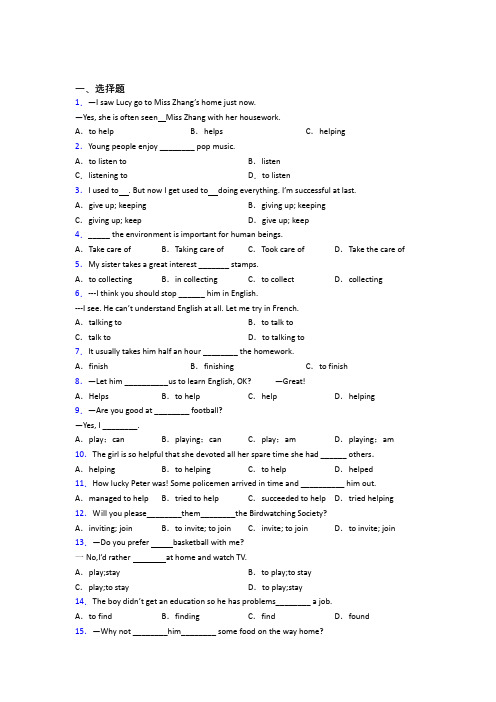
一、选择题1.—I saw Lucy go to Miss Zhang’s home just now.—Yes, she is often seen Miss Zhang with her housework.A.to help B.helps C.helping2.Young people enjoy ________ pop music.A.to listen to B.listenC.listening to D.to listen3.I used to . But now I get used to doing everything. I’m successful at last.A.give up; keeping B.giving up; keepingC.giving up; keep D.give up; keep4._____ the environment is important for human beings.A.Take care of B.Taking care of C.Took care of D.Take the care of 5.My sister takes a great interest _______ stamps.A.to collecting B.in collecting C.to collect D.collecting 6.---I think you should stop ______ him in English.---I see. He can’t understand English at all. Let me try in French.A.talking to B.to talk toC.talk to D.to talking to7.It usually takes him half an hour ________ the homework.A.finish B.finishing C.to finish8.—Let him __________us to learn English, OK? —Great!A.Helps B.to help C.help D.helping 9.—Are you good at ________ football?—Yes, I ________.A.play;can B.playing;can C.play;am D.playing;am 10.The girl is so helpful that she devoted all her spare time she had ______ others.A.helping B.to helping C.to help D.helped 11.How lucky Peter was! Some policemen arrived in time and __________ him out. A.managed to help B.tried to help C.succeeded to help D.tried helping 12.Will you please________them________the Birdwatching Society?A.inviting; join B.to invite; to join C.invite; to join D.to invite; join 13.—Do you prefer basketball with me?一No,I’d rather at home and watch TV.A.play;stay B.to play;to stayC.play;to stay D.to play;stay14.The boy didn’t get an education so he has problems________ a job.A.to find B.finding C.find D.found 15.—Why not ________him________ some food on the way home?—Good idea!A.to ask; to buy B.ask; buy C.ask; to buy D.to ask; buy 16.Sandy likes ________ TV. She ________ TV every day.A.watching; watching B.watch; watchesC.to watch; is watching D.watching; watches17.Thank you for________ me a nice gift.A.send B.sending C.sends D.to send 18.—It’s necessary ____ our environment.—I agree with you.A.protect B.protecting C.to protect D.protects 19.— What do you use MP3 for?— I ________ it ________ to music.A.use; listen B.are listening; listeningC.use; to listen D.is listening; to listening20.It’s time _________ now.A.go B.to go C.go to21.—It’s so hot here . Do you mind _____the window ?.—_____. I will do it right now .A.to close ; Yes B.to open ; NoC.opening ; Of course not D.closing ; I hope so22.Our class teacher told us ________ in the playground now for it is wet now.A.to play B.not to play C.played D.don’t play 23.Class Four plans________ a meeting about the school art festival tomorrow. A.have B.to have C.has D.are having 24.The winter holiday is coming. I really expect ________ a trip to Hong Kong. A.take B.taking C.to take25.I found it necessary _______ each other in friendship.A.trusts B.to trust C.trusting 26.—When can you finish ________ that book?—This afternoon. Then you can read it. It’s really interesting.A.read B.to read C.reading 27.Aunt Li likes bananas.A.eat B.eating C.eats28.— Have you considered ________Robert some help?— Yeah. I have already promised to lend him some money.A.give B.to give C.giving D.to giving 【参考答案】***试卷处理标记,请不要删除一、选择题1.A解析:A【解析】【分析】【详解】句意:——我刚才看见露西去了张小姐家。
中考英语非谓语动词讲解及练习(word版,含解析)

中考英语非谓语动词讲解及练习一、考点分析让学生彻底掌握并且能够熟练地运用非谓语动词的运用。
非谓语动词主要出现在语音语法词汇部分,所占分值不2-4分,难度不高,属于基础题。
但是有时也会用于首字母填空等阅读部分,同时也可以运用于作文的写作中。
二、专题详解一.学习目标:1.了解非谓语动词的基本特征2.了解非谓语动词的种类和用法3.了解非谓语动词一些特殊形式二.学习内容解析:非谓语动词即在句子中不能作谓语动词,没有任何时态和人称方面的变化。
非谓语动词包括动词不定式(to do sth.),动名词(v-ing)以及分词(现在分词doing和过去分词done)分词初中阶段不要求掌握。
动词不定式(to do)的用法:1. 作主语:To learn English well is important.To eat vegetables can help us keep healthy.△ 动词不定式作主语时,可以用动名词替换。
Learning English is important.Eating vegetables can help us keep healthy.△ 动词不定式作主语时,常用it作形式主语,而把不定式放在后面。
It’s important to learn English.It can help us keep healthy to eat vegetables.2. 作表语:My job is to teach English.His hobby is to collect stamps.3. 作宾语:(1).动词不定式常用作及物动词的宾语,这些动词有:want, begin/start, like/love, forget/remember,learn/teach, decide, hope, agree, plan, expect, manage, fail, offer, promise, refuse, pretend等。
2019中考英语专项复习单选练习题专题十非谓语动词(有详细解析、答案准确)

2019中考专项复习专题专题十非谓语动词(限时:13分钟分值:27分得分:)1. (2017宜宾)The child is crying. Please do something to make him _________.A. stop to cryB. stop cryingC. to stop crying2. (2017六盘水改编)Jane is my new pen pal. I often look forward to_________ her e-mail.A. receiveB. receivesC. receiving3. (2017宜昌改编)—You’d better advise him _________ anything out of the window while driving.—I will. He has to know it’s dangerous.A. not throwingB. no throwingC. not to throw4. (2017青岛改编)As a volunteer, the girl wants to visit sick kids in the hospital _________ them up.A. to cheerB. cheerC. cheering5. (2017黄冈改编)—Nowadays lots of products from China are very popular in the world.—Yeah! Many people can hardly avoid __________ products made in China.A. to buyB. buyingC. bought6. (2017重庆B卷改编)Dave is a good boy and he always finishes _________ his homework on time.A. doB. didC. doing7. (2017攀枝花改编)The Monkey King can make 72 changes to his shape and size, _________ himself into different animals and objects.A. turnedB. to turnC. turning8. (2017天津改编)We only planned _________ the play for an hour, but in the end,we stayed for three hours.A. watchB. watchesC. to watch9. (2017上海改编)Vivian refuses _________ her children to the weekend training centre for extra classes.A. to sendB. sendingC. sent10. (2017孝感改编)To keep children away from danger, we warn parents _________ children at home alone.A. leaveB. to leaveC. not to leave11. (2017长沙模拟)—Have you thought of the ways _________ the problem?—Of course.A. solvingB. to solveC. solve12. (2017益阳模拟)My father used to drive to work, but he is used to ________now.A. walkingB. walkC. walks13. (2017湘潭模拟)—Why not go out with me this evening?—My parents are against _________ out at night.A. goB. to goC. going14. (2017岳阳模拟)—Do you often read aloud?—Yes. __________ my spoken English, I read aloud every morning.A. ImprovedB. ImproveC. T o improve15. (2018原创)I happened ___________ an old friend on the street. We haven’t seen each other for years.A. meetingB. metC. to meet16. (2018原创)—Would you like to go swimming in the river, Jack?—Swim? Sorry, my mother always tells me___________ in the river.A. don’t swimB. to not swimC. not to swim17. (2018原创)—You seemed to be very thirsty. Would you like something __________?—Yes, I’d like a cup of apple juice.A. to drinkB. drinkingC. drunk18. (2018原创)You should practice___________ this App because it can bring you much convenience.A. useB. to useC. using19. (2018原创)It’s getting dark and you’d better ___________ out by yourself. It’s dangerous.A. not goB. not to goC. to go20. (2018预测)—Where shall we meet?—Why not ___________at the school gate? It’s near the bus station.A. meetB. to meetC. meeting21. (2018预测)Don’t forget ___________ the windows of the classroom. It seems to be rainy tonight.A. closeB. to closeC. closing22. (2018预测)It is important for you ___________ some exercises every day to improve your math.A. to doB. doingC. did23. (2018预测)I will try my best to stop my son from ___________ the same mistake.A. makeB. madeC. making24. (2018预测)—Did you talk back to your parents when you were a child?—Yes. But now I realize I was wrong. I really regret ___________ that silly thing to them.A. doingB. to doC. do25. (2018预测)When Mr. Huang left the room, we were busy___________ about the problem and didn’t notice him.A. talkB. talkedC. talking26. (2018预测)The sports meeting ___________ yesterday was a great success. All the students did their best.A. holdB. heldC. Holding参考答案1. B【解析】考查非谓语动词。
专题10 非谓语动词-备战中考英语专项突破课件(语法篇)

phone while crossing the street.
A.answering
B.to answer
C.answer
D.answered
the mobile
(B )8.(2018·扬州)—Mr.Wu has recommended many books.Have
you decided
first?
辑主语与句子主语 做一次志愿者,帮助孩子们学习如何
保持一致,在句中 阅读。【八下 Unit 2 第 12
表原因或目的
页】
He returned home to learn his son
不定式作状语可位于句末,在
had gone to the countryside.他返回
句中表结果
状
家中获悉他的儿子已经去了乡下。
表语
school for the children.我们的计划是
系动词后作表语
为孩子们创办另一所中学。
( B )1.(2020·大庆)—What's next?
—I'll have Tony
you around.
A.to show
B.show
C.showed
D.shown
( D )2.(2020·天津)I've just watched a TV programme about
space.I hope
on the moon one day.
A.walk
B.walked
C.walking
D.to walk
( D )3.(2020·泰州)More and more teenagers have poor eyesight,
中考非谓语动词专项讲解及练习(带答案)
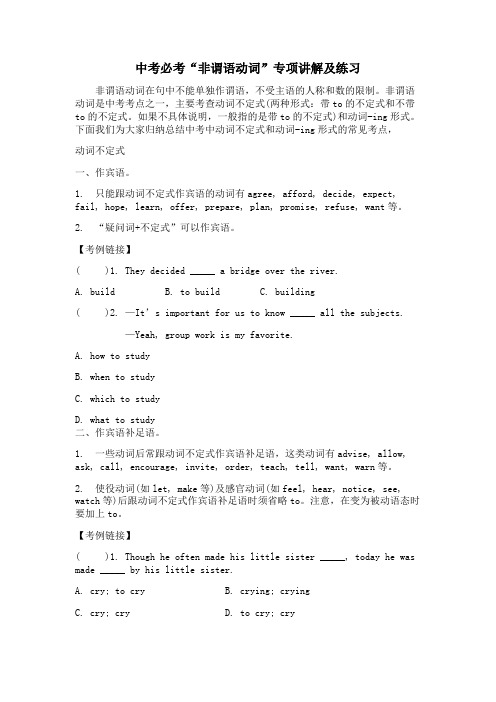
中考必考“非谓语动词”专项讲解及练习非谓语动词在句中不能单独作谓语,不受主语的人称和数的限制。
非谓语动词是中考考点之一,主要考查动词不定式(两种形式:带to的不定式和不带to的不定式。
如果不具体说明,一般指的是带to的不定式)和动词-ing形式。
下面我们为大家归纳总结中考中动词不定式和动词-ing形式的常见考点,动词不定式一、作宾语。
1. 只能跟动词不定式作宾语的动词有agree, afford, decide, expect, fail, hope, learn, offer, prepare, plan, promise, refuse, want等。
2. “疑问词+不定式”可以作宾语。
【考例链接】( )1. They decided _____ a bridge over the river.A. buildB. to buildC. building( )2. —It’s important for us to know _____ all the subjects.—Yeah, group work is my favorite.A. how to studyB. when to studyC. which to studyD. what to study二、作宾语补足语。
1. 一些动词后常跟动词不定式作宾语补足语,这类动词有advise, allow, ask, call, encourage, invite, order, teach, tell, want, warn等。
2. 使役动词(如let, make等)及感官动词(如feel, hear, notice, see, watch等)后跟动词不定式作宾语补足语时须省略to。
注意,在变为被动语态时要加上to。
【考例链接】( )1. Though he often made his little sister _____, today he was made _____ by his little sister.A. cry; to cryB. crying; cryingC. cry; cryD. to cry; cry( )2. The little girl was crying because her mother didn’t allow her _____ the ice-cream.A. eatB. eatsC. to eatD. ate三、作目的状语。
专题10 非谓语动词【课件】-2023年中考英语考前冲刺语法图解过关

满分秘籍
巧学妙记
提分特训
6.(2022·黑龙江·中考真题)I saw Lily ________ when I passed
her room.A.danceB.dancing
C.to dance
【答案】B 【解析】句意:当我经过她的房间时,我看到莉莉在跳舞。考查 非谓语动词。see sb. do sth.“看见某人做了某事”;see sb. doing sth.“ 看见某人正在做某事”。根据“when I passed her room.”可知,此处 是指看到莉莉正在跳舞。故选B。
mind ______ your radio?—Sorry. I’ll do it at once.A.turning down B.turn
down C.turning up D.turn up
【答案】A 【解析】句意:——陈先生,我的孩子在睡觉。你介意调低你收音机的音 量吗?——抱歉,我立刻做。考查非谓语及动词短语。turn down调低(音 量);turn up调高(音量)。根据“my kid is sleeping”可知要调低音量,排 除C、D;mind doing sth表示“介意做某事”,即mind后用动名词作宾语,故 选A。
满分秘籍
巧学妙记
提分特训
2.(2022·广西河池·中考真题)I usually spend time ________ in the
library on weekends.A.read B.reading
C.reads D.to read
【答案】B 【解析】句意:周末我通常在图书馆看书。本题考查动词spend的用法。 “花费时间做某事”的英文表达为“spend time (in) doing”,所以应选择动 名词形式reading。故选B。
(名师整理)最新英语中考专题复习《非谓语动词》精讲精练(含答案)
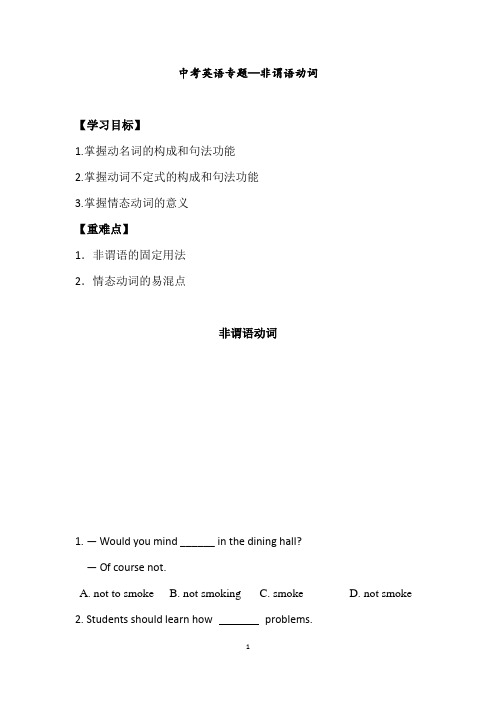
中考英语专题—非谓语动词【学习目标】1.掌握动名词的构成和句法功能2.掌握动词不定式的构成和句法功能3.掌握情态动词的意义【重难点】1.非谓语的固定用法2.情态动词的易混点非谓语动词1. — Would you mind ______ in the dining hall?— Of course not.A. not to smokeB. not smokingC. smokeD. not smoke2. Students should learn how problems.A. solveB. solvingC. can solveD. to solve3. My parents often tell me too much junk food because it’s bad for my health.A. not eatingB. not to eatC. eatingD. to eat4. She’s not strong enough _______ walking up mountains.A. to goB. goingC. goD. went5. He lost his key.It made him in the cold to wait for his wife’s return.A. to stayB. stayedC. staysD. stay构成:(to)+动词原形动词不定式非在句中的作用(除谓语动词外的任何成分)谓构成:V.-ing语 动名词动 用法(主、宾、表、定)词构成:V. -ing / V.-ed (规则变化)分词用法(表、补、定、状)(一)动名词一、动名词的构成:动名词一般由“动词原形+ing ”构成二、动名词的句法功能注意:英语中有一些词后面常跟动名词作宾语。
我们初中阶段常见的有:finish, mind, be worth, be busy, practice, have fun, have trouble/problem(in), spend...(in), feel like, be used to (习惯于), give up, keep on, consider, suggest, can't help。
- 1、下载文档前请自行甄别文档内容的完整性,平台不提供额外的编辑、内容补充、找答案等附加服务。
- 2、"仅部分预览"的文档,不可在线预览部分如存在完整性等问题,可反馈申请退款(可完整预览的文档不适用该条件!)。
- 3、如文档侵犯您的权益,请联系客服反馈,我们会尽快为您处理(人工客服工作时间:9:00-18:30)。
专题十非谓语动词Ⅰ.根据句意, 用括号内所给单词的适当形式填空1.[2017烟台]Many countries in the world are looking forward to _______ (trade) with China.2.[2017泰州]Some middle school students don’t know how to _______ (keep) a balance between study and play.3.I’d like you _______ (share) your ideas about this accident.4.[2017黔南州]I am used to _______ (drink) a glass of water after getting up every morning.5.My friend invited me _______(join)the art club, and I accepted it with pleasure.6.Thanks a lot for _______(get)back the notebook I left in the lecture hall.7.If all of us pull together, there must be something we can do to _______(improve)the environment.8.If you want to learn English well, you should practice _______(speak)it as often as possible.lie spends about two hours _______ (finish)her homework every day.10.My old neighbor Charles enjoys _______(take)photos. He always goes out with his camera. Ⅱ.语法与情景对话1.[2017扬州]Mom does all the housework so that Sarah can take the time _______ her words on paper.A. putB. puttingC. to putD. puts2.[2017河南改编]Whenever we kids come over, Auntie Susan just stands there and watches us _______ sure we don’t break anything.A. makeB. madeC. to makeD. makes3.[2017上海]Vivian refuses _______ her children to the weekend training centre for extra classes.A. to sendB. sendingC. sentD. sends4.[2017盐城]China has seen a trend(潮流)of _______ shared bikes since last year.A. rideB. ridingC. takeD. taking5.[2017龙东地区改编]My teacher often encourages me _______ at least one hour a day reading books.A. to payB. costC. to spendD. to cost6.[2017黄石]Remember _______ off the lights when leaving the home.A. turningB. to turnC. turnsD. turn7.[2017天津]We only planned _______ the play for an hour, but in the end, we stayed for three hours.A. watchB. watchesC. to watchD. watched8.[2017临沂]Doctors in the town are using the books _______ their studies and treat patients.A. continueB. to continueC. continuingD. continues9.[2017青岛改编]As a volunteer, the girl wants to visit sick kids in the hospital _______ them up.A. to cheerB. cheerC. cheersD. cheered10.[2017成都]Our English teacher wants us _______ English stories out of class.A. readB. readingC. to readD. reads11.[2017昆明]Nowadays, it’s convenient and cheap for us _______ a shared-bicycle.A. rideB. to rideC. flyingD. to fly12.[2017长春]_______ Chinese culture, many college students go to foreign countries every year.A. SpreadingB. To spreadC. SpreadsD. Spread13.[2017宜宾改编]The child is crying. Please do something to make him _______.A. stop to cryB. stop cryingC. to stop cryingD. stops crying14.[2017毕节]My parents always ask me _______ more vegetables and fruit.A. eatB. eatingC. to eatD. eats15.[2017宜昌]—You’d better advise him _______ anything out of the window while driving. —I will. He has to know it’s dangerous.A. not throwingB. no throwingC. not to throwD. don’t throwⅠ.根据句意, 用括号内所给单词的适当形式填空1.【解析】句意:世界上许多国家正盼望着与中国_______。
look forward to doing sth.为固定搭配,意为“盼望做某事”。
根据提示词可知填trading。
2.【解析】句意:一些中学生不知道怎样去保持学习和玩耍的平衡。
“怎样去做某事”用疑问词how+动词不定式。
故填to keep。
3.【解析】句意:我想要和你分享关于这起事故的想法。
would like sb. to do sth. 意为“想要某人做某事”,为固定搭配。
故填to share。
4.【解析】句意:我习惯于每天早晨起床后喝一杯水。
be used to doing sth. 意为“习惯于做某事”,为固定搭配。
故填drinking。
5.【解析】句意:我的朋友邀请我加入美术俱乐部,我很高兴地答应了。
此处考查invite sb. to do sth. 意为“邀请某人做某事”,为固定用法。
故填to join。
6.【解析】句意:非常感谢你去帮我取回我忘在演讲大厅里的笔记本。
因为介词后加动名词,故应用getting。
7.【解析】句意:如果我们所有人都齐心协力,我们一定能为改善环境做点什么。
此处考查动词不定式作目的状语,故填to improve。
8.【解析】句意:如果你想学好英语,你应该尽可能经常地练习它。
practice doing sth. 练习做某事,是固定短语,故填speaking。
9.【解析】句意:米莉每天花两个小时写作业。
spend some time (in) doing sth表示“花费多长时间做某事”。
故填finishing。
10.【解析】句意:我的老邻居查尔斯喜欢拍照片。
他经常带他的照相机出去。
本句考查enjoy doing sth.“喜欢做某事”,为固定搭配。
故填taking。
Ⅱ.语法与情景对话1.C【解析】考查不定式。
句意:妈妈包揽了所有的家务活,以便Sarah能花时间把单词写在纸上。
take the time to do sth意为“花费时间做某事”,为固定句型。
故选C。
2.C【解析】考查不定式。
句意:无论我们这些孩子什么时候过来,Susan阿姨就站在那里注视着我们,确保我们不打破任何东西。
分析句子结构可知空后的成分作目的状语,应用不定式。
故选C。
3.A【解析】考查不定式。
句意:Vivian拒绝送她的孩子去周末培训中心上补习班。
“refuse to do sth. 拒绝做某事”为固定结构。
故选A。
4.B【解析】考查动名词。
句意:自从去年开始,在中国已经看见了一股骑共享单车的潮流。
介词of 后应用动名词形式;ride bike s“骑自行车”为固定短语。
故选B。
5.C【解析】考查不定式及近义动词辨析。
句意:我的老师经常鼓励我每天至少花一个小时看书。
由固定结构“encourage sb. to do sth. 鼓励某人做某事”可知空处应为动词不定式,排除B项;pay后一般加金钱,与for连用;spend可用于spend time / money (in) doing sth. /on sth.,cost的主语为物,故本题用spend。
故选C。
6.B【解析】考查非谓语动词。
句意:离开家的时候记得关灯。
remember to do sth. 表示“记得要做某事”;remember doing sth. 表示“记得做过某事”,本句中的动作未发生,应用不定式。
故选B。
7.C【解析】考查不定式。
句意:我们计划只看一个小时的表演,但是最后,我们待了3个小时。
“plan to do sth. 计划做某事”为固定结构。
故选C。
8.B【解析】考查不定式。
句意:镇里的医生用书本来继续他们的研究,诊治病人。
分析句子结构可知所填成分作句子的目的状语,应用不定式。
故选B。
9.A【解析】考查不定式。
